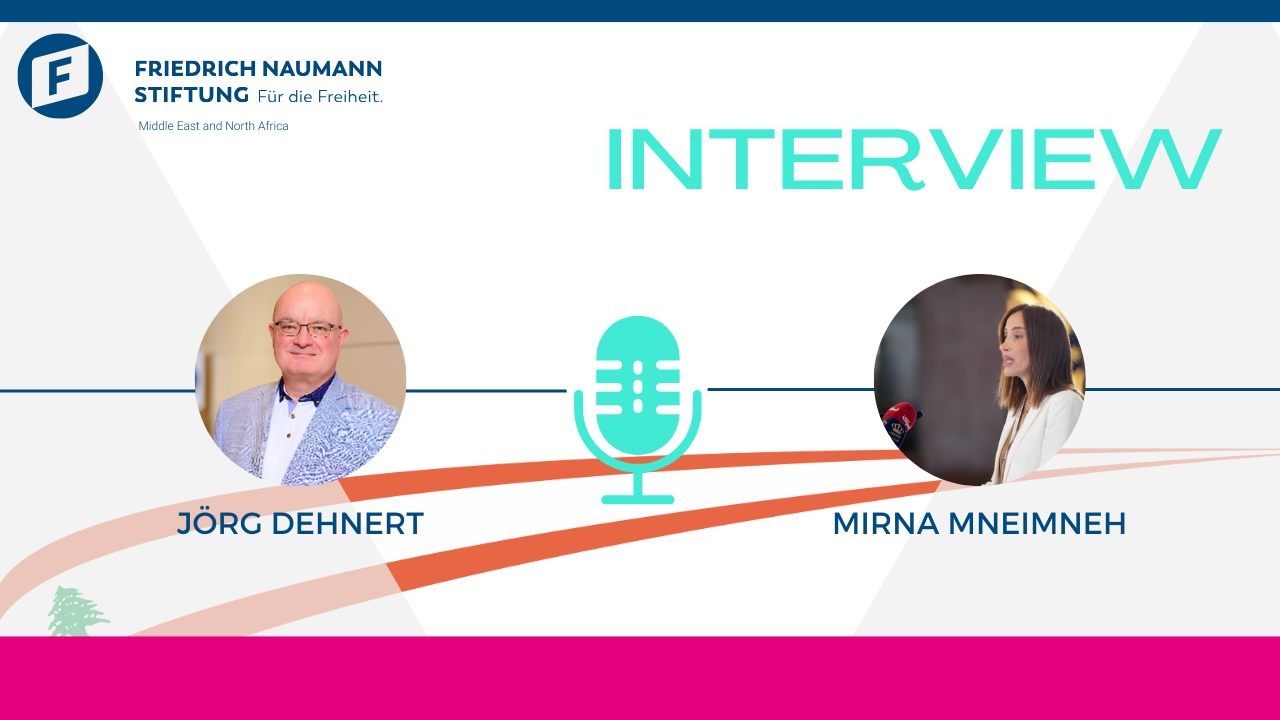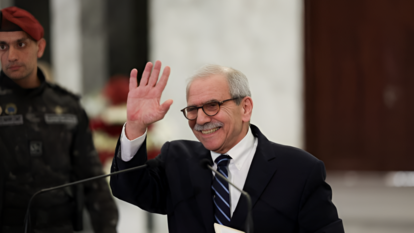The Election of Lebanon's New Prime Minister: Challenges and Implications
Lebanon’s New Prime Minister: What’s Next for the Future?

The Lebanese President appointed a new Prime Minister, who needs to be confirmed by the Parliament, much faster as expected. Who is he? What are the next steps? Which may be the challenges and consequences for Lebanon and the MENA region? We interviewed Mirna Mneimneh, member of Future Movement and the president of AHLN, the liberal network in the MENA region. The interview was done by Jörg Dehnert, Regional Director of FNF-MENA.
After being elected, President Aoun does not seem to waste time and is forming a new government. Yesterday the Lebanese Parliament voted for a new Prime Minister, Nawaf Salam with an overwhelming majority. What kind of person is he and what is his reputation and what does he stand for?
Mirna Mneimneh: Nawaf Salam, the newly designated Prime Minister of Lebanon, is not part of Lebanon's traditional political class but is closely aligned with former Prime Minister Saad Hariri and shares aspirations with the March 14 forces. At 71 years old, Salam was left-leaning in his youth and holds impressive academic credentials, including a Ph.D. in Political Science from the French University "Sciences Po," a Ph.D. in History from the Sorbonne University, and a Master's in Law from Harvard Law School. He has extensive experience, having worked as a lecturer and as Lebanon's representative at the United Nations from 2007 to 2017. Notably, Salam was nominated in 2019 by Hariri to be Prime Minister due to his clean legal record, reformist views, and neutrality. His nomination was initially unsuccessful but gained momentum in the wake of President Aoun’s election, with support from Western-backed groups and Lebanese reformist forces, as well as traditional parties such as the Lebanese Forces and the Kataeb Party. Despite this, Hezbollah and the Amal Movement, led by Nabih Berri, opposed Salam’s nomination, choosing to remain in opposition.
What are the main challenges in forming a new cabinet? How long will it take to appoint ministers and how is the process?
Mirna Mneimneh: There is no specific timeframe in Lebanon’s constitution for forming the government, creating challenges in the process. The Shiite component in the Lebanese Parliament, represented by the two Shiite blocs, has refused to nominate a Prime Minister and has indicated its intention to remain in opposition, complicating the government formation process. As a result, both the President and the Prime Minister will face significant difficulties, especially with the absence of a key political component. The Prime Minister is responsible for conducting non-binding consultations with MPs regarding portfolios and ministerial representation. Another challenge lies in the ministerial statement, which historically takes time to finalise, particularly concerning Hezbollah's role as a resistance force.
What are the major challenges for the next six to twelve months for the new government?
Mirna Mneimneh: After the new government is formed and gains the vote of confidence, it will have until May 2026, when parliamentary elections are set, to address several major challenges. The government will be responsible for implementing international and local resolutions, including UN Resolution 1701, and the ceasefire agreement between Lebanon and Israel. It must also begin the reconstruction efforts to return displaced persons to their homes and assert the state's authority across all Lebanese territories. Other priorities include negotiating with the International Monetary Fund, recovering depositors' funds, and enacting reforms to restore trust in Lebanon’s political system. Additionally, municipal elections and preparations for the upcoming parliamentary elections will need to be managed. The government will also need to make key appointments to ensure a stable administration, including appointments for the Governor of the Central Bank and the Commander of the Army.

Lebanese Prime Minister-designate Nawaf Salam getures at the presidential palace on the day he meets with Lebanese President Joseph Aoun, in Baabda, Lebanon January 14, 2025.
What could the election of President Aoun mean for the MENA region?
Mirna Mneimneh: The election of President Joseph Aoun, facilitated by international, regional, and local agreements, represents a stabilising factor for both Lebanon and the broader MENA region. In his inaugural address to the Lebanese Parliament, Aoun emphasised key priorities such as implementing the Constitution, adhering to the Taif Agreement, rebuilding relations with regional nations based on mutual respect, and fostering economic prosperity through international cooperation. Aoun’s presidency opens a historic opportunity for serious dialogue with Syria, focusing on issues like border delineation and the fate of Syrian refugees in Lebanon. Aoun has promised that Lebanon will follow a path of "positive neutrality" and will prioritise the state's right to monopolise the carrying of weapons. These developments could pave the way for a more stable and peaceful Lebanon, with wider regional implications.
What does the new development mean for liberal values and ideas?
Mirna Mneimneh: The new developments in Lebanon have significant implications for liberal values and ideas, especially in governance, democracy, and reforms. With a focus on restoring the rule of law, implementing the Taif Agreement, and addressing Lebanon’s economic crisis, there is potential for strengthening liberal principles such as individual freedoms, human rights, and political pluralism. The government's emphasis on sovereignty, neutrality, and non-interference in regional conflicts aligns with liberal ideas of national autonomy and peace. However, challenges such as political fragmentation, sectarianism, and the influence of non-state actors and Hezbollah could hinder the realisation of these liberal values. If successful, reforms could foster a more inclusive, democratic, and transparent Lebanon, creating an environment where liberal values like equality, justice, and economic freedom can thrive, though this will require overcoming significant political and societal obstacles.
